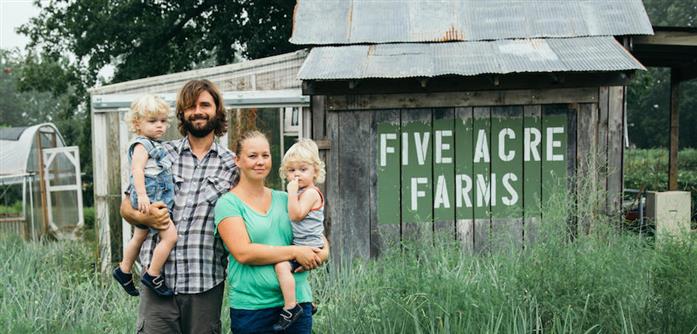Grass Roots hopes to start a revolution in small-scale farming in Arkansas
by July 17, 2017 10:43 am 1,997 views

Chris Ward was working for the United States Department of Agriculture Foreign Agriculture Service in Afghanistan when he realized he needed to do something different on his livestock farm near Harrison.
He and his wife, Melanie, decided in 2015 to join the Grass Roots Farmer Cooperative, based in Clinton. The cooperative is funded by Heifer International, and it could serve as a model for other cooperatives in other states.
“The cooperative has been a good fit,” Melanie Ward told Talk Business & Politics. “It’s been a very positive experience for us. It has met our needs.”
Small-scale farmers are under fire, and something needed to be done, Grass Roots General Manager Cody Hopkins said. Profit margins are tight at best, and farmers have to perform the business and marketing functions of the farm which takes time away from farming, he said. Grass Roots has developed a model that can help farmers avoid doing these ancillary tasks, and focus on the thing they love to do – grow livestock.
The cooperative allows farmers to buy farm products as a collective, meaning they can get many of these products at a greatly reduced rate, akin to larger farm operations, Hopkins said. There are shared market opportunities, too. Agreements with organic food companies, restaurants, and other retailers are under development, he said. E-commerce, or direct sells to potential clients will be more fully utilized. Tools to capitalize farm operations, such as loans are also included in the program. The goal is to have 100 farmers from across Arkansas in the cooperative during the next five years, he said.
Chickens are the most common livestock raised by cooperative members. The reason is simple. Chickens are cheaper to buy and cost less to raise, two vital factors for any upstart farmer, Hopkins said. Grass Roots will provide startup money for farmers and help them acquire necessities. In return, the farmer agrees to raise the livestock according to the cooperative standards. For instance, chickens are raised in pasture lands, instead of coops. Processed animals are then sold through the cooperative’s distribution channels. The goal is to allow farmers to make a livable wage from $35,000 to $45,000 per year, he said.
One problem for chicken growers is the lack of processing plants. Grass Roots and Cyprus Valley Meat Company aligned in 2016 to form Natural State Processing, and opened a poultry processing plant in Clinton. Access to the plant is a key tool for chicken farmers in the cooperative, he said.
Livestock raised under these environmentally friendly standards are healthier and a better food source than those that come from mass production models, Hopkins said. Packaging codes will reveal to buyers what pasture their animal was raised in, and it will show under what circumstances it was raised. It will provide a new level of transparency for food production, Hopkins said.
“It will allow the customer to understand where their food is coming from,” he said.
Farmers are vetted to determine if they will be a good fit for the cooperative. A trial year is floated, and the techniques and expectations are meted. If the farmer and the cooperative think the partnership is viable, then they become a member. Farmers in the system have an invaluable resource that can’t be translated to profitability ratios or other metrics – they have access to other farmers facing the same market pressures and other struggles that come with the vocation.
Heifer International, through its domestic division, Heifer USA hopes the Grass Roots model will be successful in Arkansas, and then it can use it in other states across the country. It has given the cooperative more than $3 million in seed money. It is simultaneously supporting New South Produce Cooperative, one that focuses on plant crops. It has given under $1 million to that organization.
Melanie Ward has been so involved with the cooperative she has been selected as its board chair in 2017. The cooperative hopes to make inroads with pig and cattle farmers, but those types of farmers are more difficult to scale do to higher livestock input costs, she said. Many small-scale farmers face impossible sustainability challenges, she said. Many don’t make enough money to survive, have to market and run their businesses on their own, and don’t have access to resources.
Ward and their family raise chickens, cattle, pigs, goats, and sheep. They have about 600 acres to farm. Many of the problems other farmers have they don’t in terms of usable acreage. Her family loves to farm, and the cooperative has been a blessing, she said. There’s nothing she loves more than to watch a chicken in the yard pick up a bug or other shiny object and watch if dash away, with all the other chickens in hot pursuit. For one moment, one chicken controls the entire flock.
“We love to farm, and we love our farm,” she said.
–––––––––––––––––––––
Editor’s note: This is the second of two stories about Heifer International. Link here for the first report.
